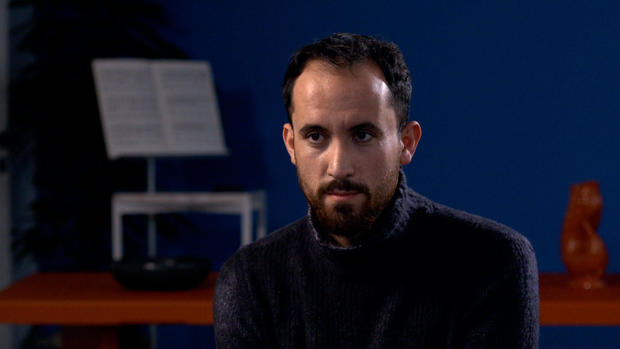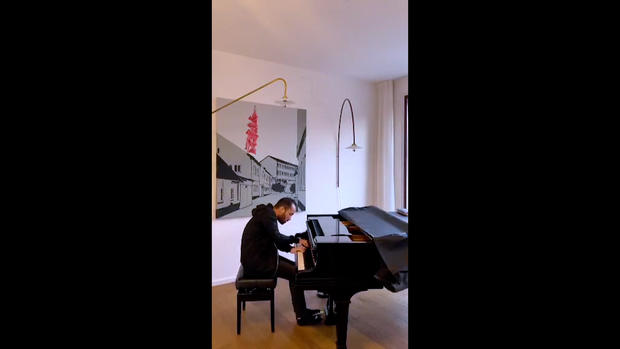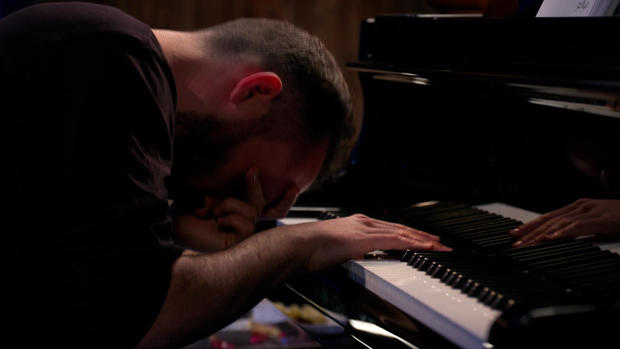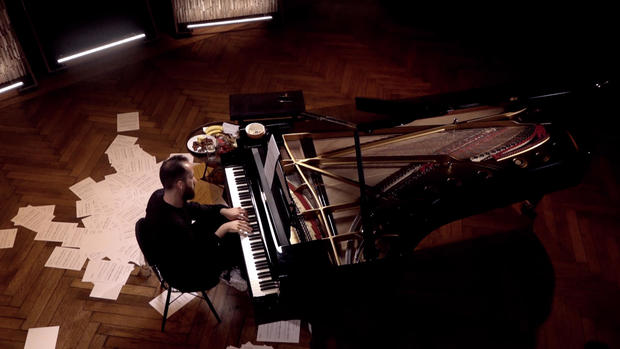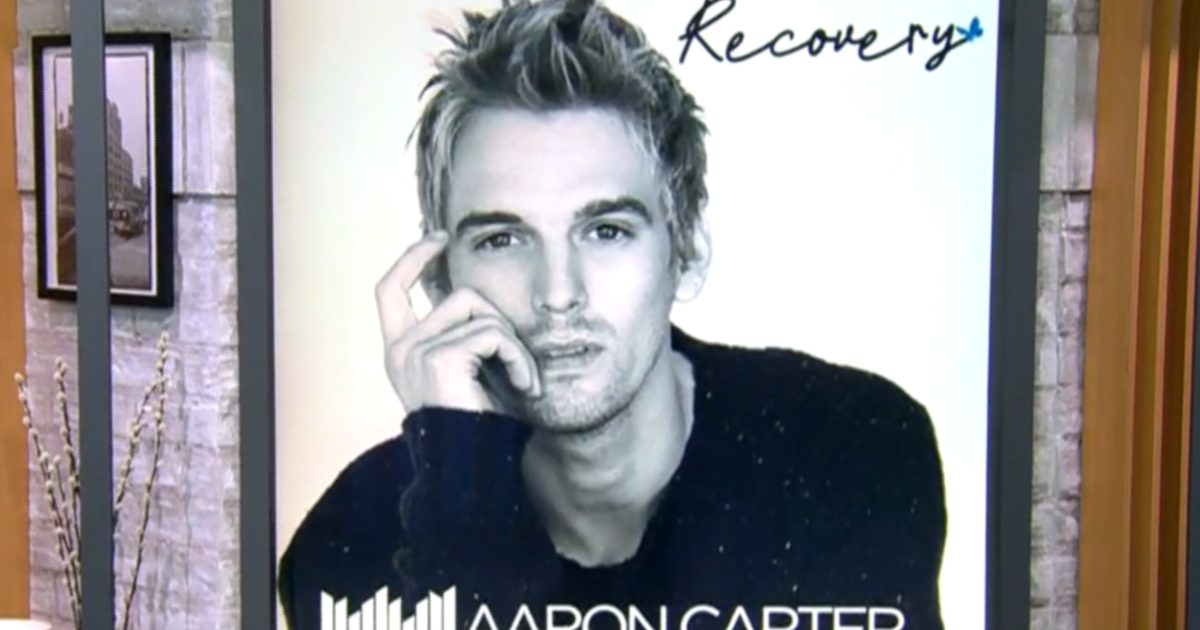Igor Levit: The classical music star streaming performances from his living room
When the German pianist, Igor Levit was selected as the featured soloist of the Nobel Prize ceremony last month, it marked yet another grace note in a career that's quickly grown filled with awards and honors. In line for a Grammy later this month, Levit is 33 and already among the brightest stars in the classical music cosmos. But lately, as the pandemic mutes and muffles so much music, Levit's performances have been mostly streaming over Twitter from his Berlin living room. As Igor Levit plays in a new way to a new audience, he's reached a conclusion: music is not an extravagance, but a life necessity.
Igor Levit is, to mix musical genres, a rock star. Here he is inside London's Royal Albert Hall, for the opening at The Proms in 2017, one of the oldest and most anticipated festivals on the concert calendar. A typically glowing review described the performance as "fiery," "magical," and "elegant." Take a look at how Levit curls over his instrument. At odds with every piano teacher's demand for perfect posture, it's almost as if Levit is physically becoming part of the music he is conjuring.
Jon Wertheim: We sometimes think of musicians as-- they don't mind the isolation. They can be disengaged. I get the feeling, you need that connection with an audience.
Igor Levit: I couldn't live without that. since my very childhood what I care about are people--
Jon Wertheim: Always.
Igor Levit: Always.
Even in a vast and venerable concert hall, this German musician has a way of creating an intimacy with his audience.
Then in March, the pandemic hit. His tour dates cancelled, that intimacy evaporated.
Jon Wertheim: In many ways, the lockdown turned your world on its head.
Igor Levit: It's a disaster--
Jon Wertheim: -technicians and the lighting-
Igor Levit: A disaster. Agents, managers.
Jon Wertheim: What happens?
Igor Levit: They lose everything from one day to the other. The loss is-- by 100%. it's a total disaster.
It could have been a disaster for Levit, a hipster, suddenly grounded at home in an edgy pocket of Berlin.
Igor Levit: I can't just make music for myself. It's just not-- not the-- not the way I operate. I can't, emotionally. So I had this idea to bring one of the most classic ways of music making, which is the house concert, to bring it, to try to bring it into the 21st century. So how do I do it? So I invite the people into my living room in the only way possible, which is through social media.
First, he tweeted out an invitation to his followers.
Next, he rushed out to buy a cheap camera stand, hastily rigged his iPhone, self-administered a tutorial in live-streaming and then, it was showtime.
The first house concert drew a virtual crowd of 350,000.
Jon Wertheim: Sounds kinda liberating.
Igor Levit: It's completely transformed me, who I am, how I see the world,
Jon Wertheim: that would seem to dramatically change the boundaries between a performer and the audience.
Igor Levit: It-- yeah, it was just me, no hall, no questions about acoustics, no questions about an instrument, no questions about, you know, pre-printed programs, nothing. No boundaries, just-- just myself and the people.
He had his classical repertoire, but added soul and jazz and rock.
For 52 consecutive nights of live concerts, his followers joined from all over the world, unbothered by the tinny sound of his piano when it lapsed out of tune.
They kept coming; he kept playing.
Igor Levit: Because of the pandemic. And so what usually must be right was wrong, and it didn't matter. 'Cause just-- just the fact that there was music, no matter how it sounded. Just the fact that there was some kind of togetherness. Just-- just this was enough for people to feel better. It was enough for me to feel better.
So much better, he next streamed what was less a challenge to his musical talents, than to his musical stamina. The "Vexations" is not exactly a reliable crowd-pleaser.
Igor Levit: The "Vexations," which is a very odd, very weird-- kind of non-music piece. It doesn't really make sense. Starts with one hand alone, and you play a weird variation. Then you play it-- same thing again. One hand alone, then you play another variation.
French surrealist composer Erik Satie intended this piece to be played through 840 times. The repetition can be almost hypnotic, known to cause performers to hallucinate - one complained of seeing bugs crawling between the keys. Levit played this piece for 16 hours straight.
Jon Wertheim: Igor, that sounds like torture, not music.
Igor Levit: Well-- Vexations, right? (LAUGH) I rest my case. And so I thought wow, that's the perfect match for this time.
Igor Levit: And I could focus with this performance on the emotional and mental state of mind of my world, of the performance world which is hopelessness, confusion, and give, like, a silent scream, like the end of the third part of "The Godfather."
Jon Wertheim: You survived?
Igor Levit: I not only survive, I was high as a monkey afterwards. I mean, I was-- I was just flying.
Levit took flight early, playing Beethoven's Sonata No. 2, winning a prestigious Rubinstein Prize as a teenager. He was born in Nizhny Novgorod, Russia, that's where he played his first concert with a full orchestra when he was 8 he and his family moved to Germany as Jewish refugees. His mother was a piano teacher but paired her talented son with a taskmaster who demanded Levit practice that same Beethoven's Sonata No. 2, for years on end. Levit says he was an angry and unhappy adolescent, who flirted with quitting piano.
Igor Levit: I was a 15-year-old boy. Like, I-- you know, I wanted to do all kinds of things, but not play the same piece over and over and over and over and over again.
So how does a burned-out piano prodigy get his mojo back? Channeling Eminem and his single "The Way I Am."
Igor Levit: I am who I am. And I am. And the way I am just-- deal with it. And sort it out for yourself. So I would listen to the song like nonstop. Walkman in my hand. It was, like, in a loop the rhythmical persistence, the-- the-- the lyrical persistence. It's so-- it's so Beethovian, you know, in a way.
Jon Wertheim: Slim Shady's helping you--
Igor Levit: Slim Shady--
Jon Wertheim: --understand Beethoven?
Igor Levit: Understanding myself, yeah.
Jon Wertheim: Beethoven obviously means a great deal to you. You said he's-- he's around you. He's in practically everything you do.
Igor Levit: In-- in a weird way, Beethoven's music is my safe zone. It's music which gives me, which gives the audience. The feeling of participation. At some point, you-- you get this feeling like, "Oh, this is about me. This is about me." Like you know.
Igor Levit: Right.
Jon Wertheim: That's how you feel?
Igor Levit: This feeling of SOS, help, what is happening here. Both for me as a player and for the listener. So I'm not trying to explain something to you. I wanna encourage you to understand hey, whatever you feel, it's-- it's you. It's your music. It's your piece. And so-- Beethoven-- Beethoven's music kind of creates this link between the player, the music, the audience. This triangle is enormously intense.
Jon Wertheim: And yet, you coulda played a different piece with that same triangle and a completely different range of emotions--
Igor Levit: Completely I could, you know, anything, you know?
Jon Wertheim: What about sadness?
Igor Levit: Well, that's a wide topic. I mean, what kind of sadness?
Jon Wertheim: Say, mournful sadness?
In a part of the world that knows a bit about musical genius, Levit may be consumed by a composer born 250 years ago; but he is also the quintessential creature of the present. Levit doesn't drive, but in between lockdowns in October, we tooled around with him on one of his many bikes.
Jon Wertheim: When did you feel like a German here? You came when you were 8 years old. Immediately?
Igor Levit: When I felt like a German?
Jon Wertheim: I don't know, when did you feel--
Igor Levit: Oh wow that's-- That, Mr. Wertheim, is a very German question.
Levit takes his citizenship seriously. At a protest against the destruction of this forest last month, Levit bundled up and played in solidarity — the environment is one of his many causes. He's adamant, as he puts it, not to be the guy who just pushes piano keys.
When, a Neo-Nazi carried out a deadly attack outside a synagogue in the German city of Halle in 2019, Levit used his appearance at Germany's most prestigious music award ceremony to speak out against right-wing extremism and anti-Semitism.
Levit has been told to his face that he has no right to be in Germany. More alarmingly, before the pandemic, he received online death threats, forcing him to take the stage under armed police guard. His activist politics have provoked attacks on multiple fronts.
Jon Wertheim: As a Jew you were an outsider--
Igor Levit: Correct. "I will find you on that day in Wiesbaden and will kill you while you're on stage." Both of them take a rubber and try to erase you from-- from Mother Earth, both of them. One of them intellectually, the other one physically.
The sedate cocoon of classical music isn't accustomed to death threats and talks of erasure. But then again, Igor Levit cuts a singular figure. And, in the days of soaring COVID rates and depleting concert dates—he plays on. In Munich, we caught up with him for a rare performance that wasn't cancelled. There was no hum of anticipation in the lobby, no bustling coat check and the audience: it was restricted to just 50 people.
Mozart was on the menu. A canopy of notes, sharply rendered, filled the air, a measure of comfort in these uncertain times.
Produced by Michael H. Gavshon. Associate producer, Elizabeth Germino. Edited by Daniel J. Glucksman.
